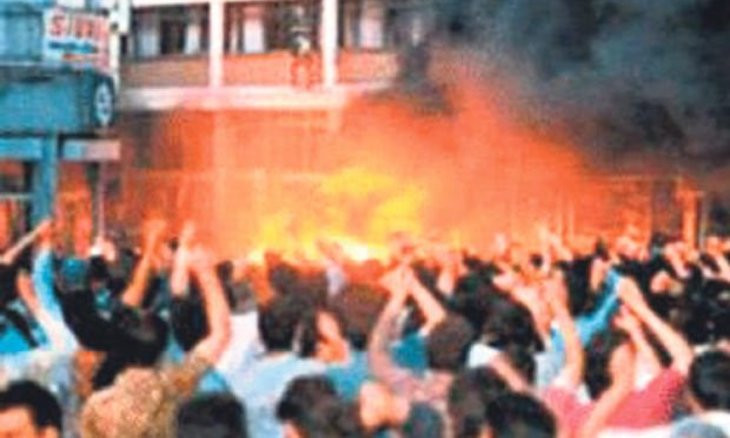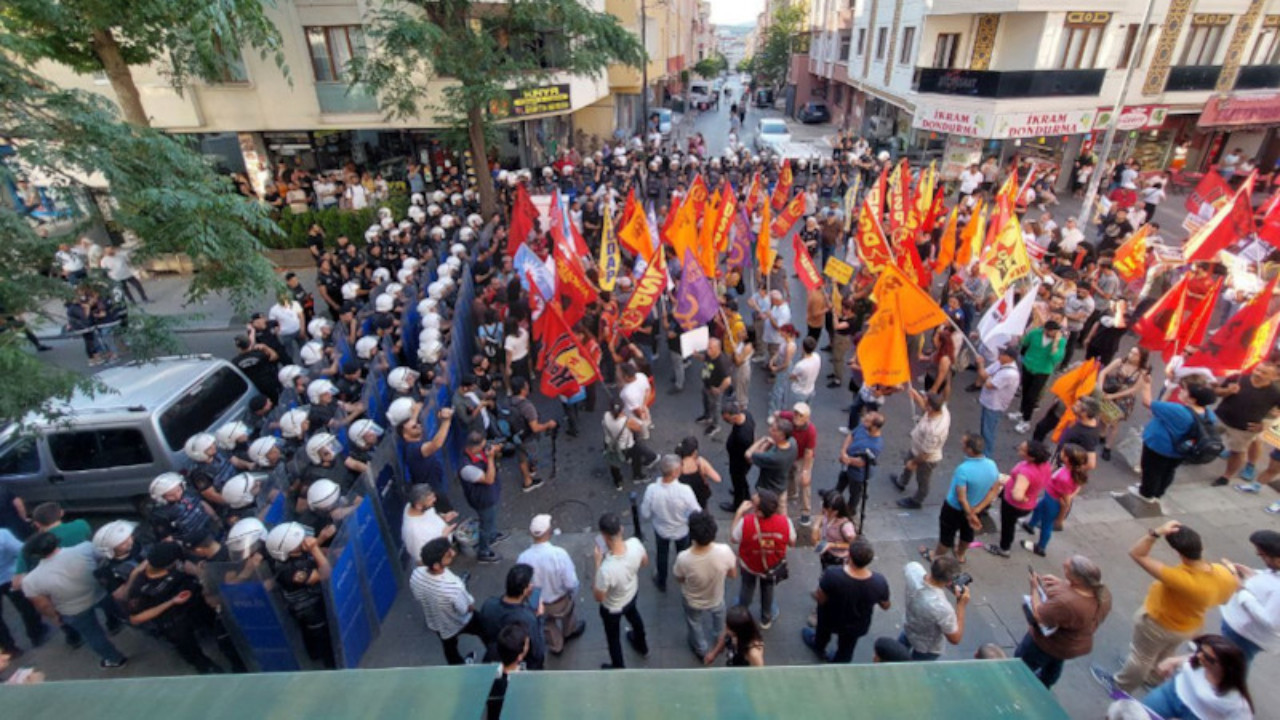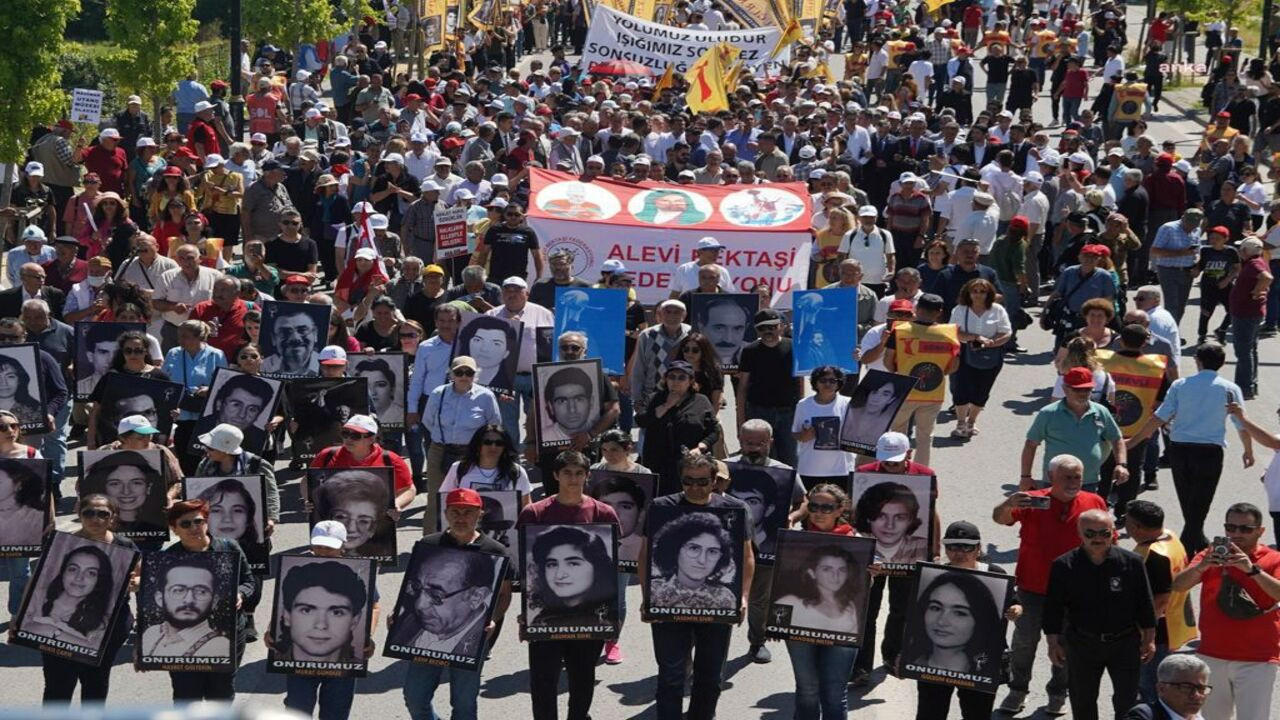Turkish court drops Sivas Massacre case due to statute of limitations
A Turkish court ruled that the case against three fugitive defendants of the Sivas Massacre, which has been ongoing for 30 years, be dismissed due to the statute of limitations. The massacre took place when a mob set the Madımak Hotel in the Central Anatolian province of Sivas on fire on July 2, 1993, killing 33 intellectuals and two hotel personnel.
Duvar English
The Ankara First Heavy Penal Court on Sept. 14 ruled that the trial of fugitive defendants of the Sivas Massacre Murat Sonkur, Eren Ceylan, and Murat Karataş to be dropped due to the statute of limitations.
The massacre took place when a radical Islamist mob set the Madımak Hotel in the Central Anatolian province of Sivas on fire on July 2, 1993, killing 33 intellectuals and two hotel personnel.
The main case of the Sivas Massacre Trial was also dropped in 2012 due to statute of limitations and the files of three aforementioned defendants were separated.
The prosecutor of the case, who declared his final opinion, argued that the fugitive status would not affect the statute of limitations and requested the case to be dismissed.
The court accepted this view and dropped the case. Thus, there is no longer any case against the defendants who have been on the run for 30 years.
Lawmakers from Green Left Party, Republican People’s Party (CHP), and Labor Party (EMEP) also came to observe trial.
Hüseyin Karababa, one of the complainants, said that Temel Karamollaoğlu, the governor of the time and leader of the Islamist opposition Felicity Party, should be summoned to the court. Karababa said, "Karamollaoğlu is one of the murderers. I saw it with my own eyes, he piled the stones. No one from the state was tried. The state committed a crime against Alevis in Sivas. There was a genocide.”
Şenal Sarıhan, who has been the lawyer of the case for 30 years, pointed to the empty seats of the defendants and said, "We have been saying for years that this is a crime against humanity. There can be no amnesty for these crimes, there can be no statute of limitations."
Sarıhan stated that the trial has been carried out by many committees for years and, “Very recently, in 2019, we made a request from your predecessor committee for three defendants to be categorized as fugitives. This request was accepted. Leaving aside the issue of crimes against humanity, all three defendants were deemed fugitives. Fugitive status stops the statute of limitations."
The statute of limitations in Turkey is 30 years for offences punishable by aggravated life imprisonment. According to the Turkish Penal Code (TCK), “the systematic commission of the offence of intentional killing against a section of the society with political, philosophical, racial or religious motives” constitutes a crime against humanity. The statute of limitations does not run for these offences.
Again, according to the TCK, the statute of limitations stops after a fugitive decision is taken.
The police intervened those who wanted to protest the verdict by staging a sit-in protest inside the courthouse.
Alevi associations made a press statement in front of the courthouse after the trial. Pir Sultan Abdal Association President Cuma Erçe said, " This case will not be left to the judgement day.”
What happened?
In 1993, almost 15,000 people participated in the march towards the Madımak Hotel after Friday prayers in which radical Islamists chanted "Sivas will be the grave of secularists." Security forces did not intervene against the Islamist mob who waited in front of the hotel for hours and eventually set it on fire. The fire brigade also intervened late.
At the end of the long trial process, 33 defendants were sentenced to death and 14 defendants were sentenced to prison terms ranging up to 15 years. In 2002, the death penalty was abolished and 33 people were sentenced to life imprisonment. Eight key figures in the Sivas massacre escaped and disappeared in 1997.
Many of the defendants' lawyers have risen to parliamentary and ministerial positions in conservative right-wing parties.
Turkish President Recep Tayyip Erdoğan on Sept. 6 pardoned a man named Hayrettin Gül convicted of taking part in a massacre in 1993.
Erdoğan has previously pardoned Ahmet Turan Kılıç, who was sentenced to aggravated life imprisonment over the Sivas Massacre, similar to Gül.

 Erdoğan pardons another man convicted of taking part in burning 35 people alivePolitics
Erdoğan pardons another man convicted of taking part in burning 35 people alivePolitics Istanbul police attack and detain demonstrators commemorating victims of Sivas MassacreDomestic
Istanbul police attack and detain demonstrators commemorating victims of Sivas MassacreDomestic Turkey commemorates victims of Sivas Massacre on 30th anniversaryDomestic
Turkey commemorates victims of Sivas Massacre on 30th anniversaryDomestic